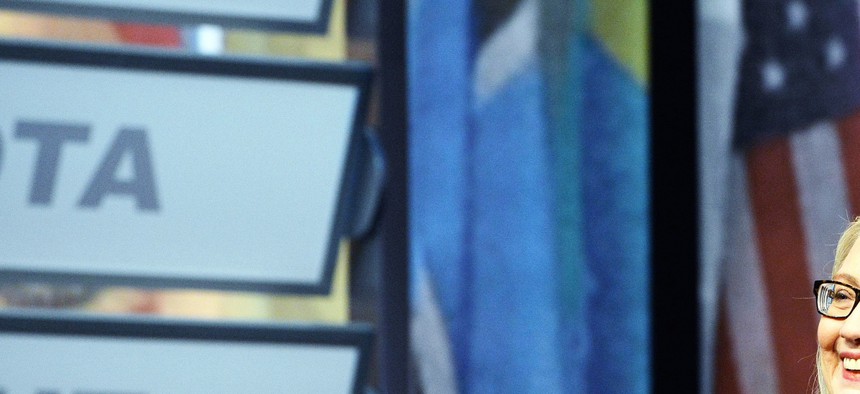
State Department file photo
When Will Hillary Clinton Stake Out Her Policy Positions?
Whenever she wants to—for better or for worse.
Hillary Clinton barely has to lift a finger to command an astonishing lead in a presidential primary that's still 405 days away. A recent Bloomberg Politics poll found that 62 percent of likely Democratic voters in New Hampshire said they'd support Clinton for president in 2016.
In many ways, Clinton is a very well-known quantity—after all, she's been a public figure for more than 30 years. But on many specific policies, Clinton has remained coy, often opting to speak out about women's equality in the workplace rather than tackling the political debates of the day. Should she run for president a second time, she's given little indication as to what that her campaign would look like, or what policy platform would form its framework.
Even Democratic loyalists seem to be confused about what Clinton's philosophy going into 2016 would look like. As Ryan Lizza recently wrote, "Everyone in the party seems to be supporting her, and yet nobody can articulate exactly why."
We got perhaps the first real policy position from Clinton on Thursday, when she voiced her support for President Obama's executive action on immigration. So, when can progressive policy wonks (and reporters) expect more fleshed-out policies from Clinton?
Don't hold your breath.
An educated guess would be shortly after she announces her candidacy—if she does, in fact, decide to run—in "early 2015." Joe Trippi, a veteran Democratic operative, said that Clinton would be ill-advised to start laying out her platform until she and other serious Democratic opponents have announced their candidacy.
"There's no imminent reason for her to have to start doing that," Trippi said. "The clock's not ticking on any of that for her, because of all the advantages she already has."
That may be a fine strategy for the many solid-blue Democrats who have already mentally cast their vote for Clinton in 2016, but some progressive activists are wary about her record. The progressive wing of the party is particularly focused on two areas—blocking the Keystone Pipeline and reforming the National Security Agency's mass-surveillance programs. Clinton's near-silence on both isn't going over well.
NSA reform
It's been more than a year since NSA contractor Edward Snowden leaked a trove of top-secret documents exposing the U.S. government's mass surveillance apparatus. Last week, Senate Republicans blocked legislation that would rein in the NSA's spy programs. Clinton could have easily penned an op-ed about the stalled bill in The Times or The Post, or even issue a statement as she did after Obama's immigration announcement. Instead, she chose to say nothing.
Neema Singh Guliani, a legislative counsel for the American Civil Liberties Union, said Clinton will need to break her silence on NSA reform soon.
"You've seen prominent political figures stake out a position and express their concern. You see, for example, Jim Sensenbrenner—who was one of the drafters of the Patriot Act—say, 'Look, this isn't what I intended,' " Guliani told National Journal. "If she is a presidential candidate, I don't think this is an issue that she's going to be able to avoid, and I don't think it's an issue that really any candidate is going to be able to avoid."
On privacy, Clinton's legislative record is somewhat of a mixed bag. After 9/11, she voted for the Patriot Act—along with 96 of her fellow senators. In 2008, she voted against an amended version of the Foreign Intelligence Surveillance Act, which paved the way for the surveillance systems, along with giving the government wide berth to monitor American civilians.
Since her time in the Senate, Clinton has largely stuck to platitudes about balancing privacy with national security interests. On the campaign trail she praised Sen. Mark Udall for calling for NSA reform. But back in April, she told a crowd of college students that the Snowden leaks "gave all kinds of information, not only to big countries, but to networks and terrorist groups and the like."
Privacy activists are perplexed by Clinton's apparent cognitive dissonance.
"I think it's really hard to tell what her position is," Guliani said. "When we look at her prior voting history, that was before the disclosures, and I think before the public and before members of Congress frankly knew what was happening. And so whether that changes things, I think it really remains to be seen."
Keystone pipeline
Aside from immigration, government funding, and the ongoing battle against the Islamic State, the Keystone pipeline may be the biggest legislative topic facing Congress. Yet, despite campaigning for Sen. Mary Landrieu, a pipeline-advocate, Clinton has maintained radio silence on the crude-il pipeline, which would stretch from Alberta, Canada, to the Gulf of Mexico.
Environmental activists have found her response to the fossil -fuel debate in general, and Keystone specifically, to be lacking, to say the least. Bill Snape, a senior counsel for the Center for Biological Diversity, told National Journal that while Keystone may seem like a niche concern, it represents a far larger ideological rift.
"The fundamental issue with Keystone for Hillary is that it's a microcosm of her position on fossil fuels in general," Snape said. "She's trying to straddle a number of worlds right now.... At some point, you're going to have to make a decision."
Jerry Austin, an Ohio Democratic strategist and Jesse Jackson's former campaign manager, pointed out that if Clinton were still secretary of State, the Keystone pipeline would be "under her aegis." As it stands, Clinton is still a quasi-private citizen, and she's said next to nothing on the topic.
"Because she is a presumptive candidate, everybody wants to know where she stands on these issues," Austin said. "I don't think she can get away with waiting a long period of time to answer them."
But while it may irk activists, some Democratic strategists say silence can be a virtue.
"It's better to really formulate the policies that she wants to implement and govern with, and only when she's ready to articulate those would I advise her to go out and talk about them," Trippi said. "Understanding where you want to take the country before you enter the race is a much better formula, a much better way to get to the presidency than focus-grouping, polling or reacting to interest groups in either party."
It's the economy, etc.
Al From, a veteran Democratic strategist who served as Bill Clinton's domestic policy adviser in 1992, told National Journal that the general state of the economy will weigh more heavily on voters' minds than Keystone or NSA reform.
"The most challenging issue for any candidate for president is on questions of economic growth and economic equality. It looks like she's feeling some pressure to take a more populist line on these issues than she has in the past. But she's also been very careful not to get nailed down on specifics," From said.
While the Clintons have often praised From's work, progressives are not so enthusiastic about his governing philosophy. Jesse Jackson once said that From's organization, the Democratic Leadership Council (or DLC), stood for "Democrats for the leisure class."
From says the top-of-mind progressive issues of 2014 matter just as much—or as little—as they did back then.
"It's more than likely that Keystone will have long since been decided by the time the 2016 Iowa Caucuses happen. But this longer-term economic debate, and how she approaches it, is a challenge that's not going away," From said.
Keeping it under wraps
Clinton's silence may frustrate special-interest groups on the left—and the donors who are trying to figure out whom to support—but it's a tried-and-true political strategy. Why show your cards when you haven't even been dealt in yet?
"Anybody who's been through this—and she has—knows you take your time, you think things through, you develop your policies, and then you decide to go or not," Trippi said. "There are a lot of people who haven't done this before who think you just announce an exploratory committee and go. Those candidates tend to end up on the side of the road."
Daniel Schnur, who served as Sen. John McCain's spokesman during McCain's 2000 presidential campaign and who is now director of the Jesse M. Unruh Institute of Politics at the University of Southern California, sees bigger questions ahead. Schnur said that, while wearing the badge of Inevitability can have its perks, Clinton will eventually need to lay out an argument for her candidacy, beyond the fact that she's the most well-known candidate.
"Because she's the front-runner, she can afford to wait as she wants to," Schnur said. "But the longer she waits, the more likely it is that potential supporters start asking what's motivating her to run, and even simply, 'Do you want to be president?' "







